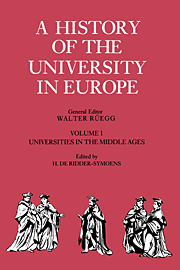Book contents
- Frontmatter
- Contents
- List of maps
- Contributors and editors
- Reader's guide
- Bibliographical abbreviations used in notes
- FOREWORD
- Acknowledgements
- PART I THEMES AND PATTERNS
- PART II STRUCTURES
- PART III STUDENTS
- PART IV LEARNING
- THE FACULTY OF ARTS
- EPILOGUE
- Editors' note on the indexes
- Name index
- Geographical and subject index
EPILOGUE
THE RISE OF HUMANISM
- Frontmatter
- Contents
- List of maps
- Contributors and editors
- Reader's guide
- Bibliographical abbreviations used in notes
- FOREWORD
- Acknowledgements
- PART I THEMES AND PATTERNS
- PART II STRUCTURES
- PART III STUDENTS
- PART IV LEARNING
- THE FACULTY OF ARTS
- EPILOGUE
- Editors' note on the indexes
- Name index
- Geographical and subject index
Summary
The epochal consciousness of humanism
In his ground-breaking book, Die Entstehung der Universitäten des Mittelalters bis 1400, published in 1885, Denifle justified his closing date by saying that ‘the fifteenth century everywhere witnessed the emergence of a new situation’. Kaufmann in his ‘prehistory’ of the Geschichte der deutschen Universitäten, which he dedicated to the University of Bologna for its jubilee of 1888, differed from Denifle and included the fifteenth century in the second volume, which dealt with the ‘origin and development of the German universities up to the end of the Middle Ages’. Most historians agree that there is a dividing line somewhere around 1500. Some of them, particularly social historians and historians of science, see that dividing line as coming much later; they say that, until the ‘scientific revolution’ of the seventeenth century or the ‘industrial revolution’ of the eighteenth century, little change had occurred in social structure from what it had been in the Middle Ages.
The introduction to volume II will treat this problem. Here, however, we are interested in the sense in which the fifteenth century ‘witnessed the emergence of a new situation’. As the text, list, and maps of chapter 2 show, the universities continued, despite the deep economic, religious, and political crises which shook Europe between 1350 and 1450, to expand during the fifteenth century. Around 1500, universities also existed at the periphery in Uppsala, Aberdeen, Palma, and Cracow. Within the central areas from Louvain and Vienna to Ferrara and Alcalá, the map of the universities became dense. Yet the character of the universities did not change fundamentally during this time.
- Type
- Chapter
- Information
- A History of the University in Europe , pp. 442 - 468Publisher: Cambridge University PressPrint publication year: 1991



